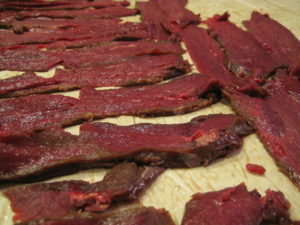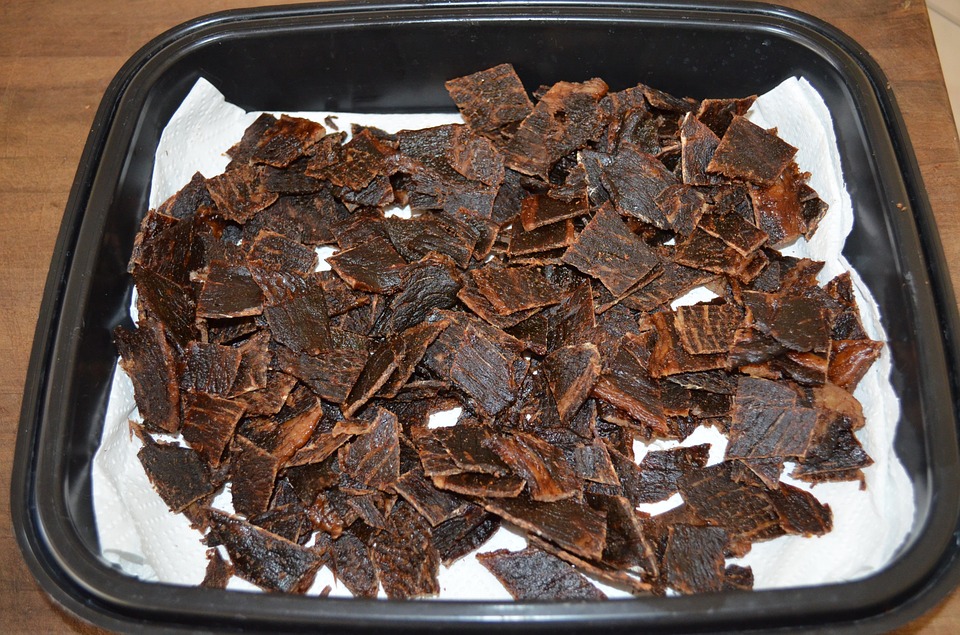Since the dawn of time, drying the meat is the best way to keep it edible. Although new methods have been developed to keep your meat fresh (freezing, chemical products, etc.), drying remains one of the favorite techniques for its taste and convenience. In addition, since moisture and fat are removed, this makes your tasty homemade beef jerky is an excellent source of protein.

First step: prepare the meat
Select your piece. Choose lean meat, such as sirloin, flat sides or the eye of round, this will save you time later. Turkey meat can also be dried, it has a milder taste which makes it ideal if you want to use spices. In addition, Turkey meat is lean, which makes it easier to prepare.
Don’t limit yourself to the beef and Turkey. According to regions and meat at disposal, vary the pleasures with bison, deer, salmon, etc.
Remove any fat that might make that meat spoils. Freeze your meat for five hours, then cut it into thin strips of three to five millimeters thick. Cut following the direction of meat and remove the fat in the process.
Marinate the meat, mix olive oil, vinegar, and salt, or follow a recipe that you like, then place the meat in an airtight container in the refrigerator for 24 hours so that it takes the taste of the marinade.
Note that this step is optional, the meat may take longer to dry if it has marinated and it can be slightly sticky at the end. You can also add cane sugar.
- A marinade recipe to try: liquid smoke, soy sauce, some Worcestershire sauce (British sauce on sale in supermarkets), Tabasco and sugar cane.
- Another recipe whose ingredients are easy to find: a pint of dark beer, honey, soy, mustard seeds, garlic, and lime juice.
- Think to face your marinade recipes with Chili! Use it with moderation anyway.
- You can also diversify your marinades with tastes from elsewhere: Add pineapple juice for meat dried in the Hawaiian style, ginger for Asian inspiration, of curry for the Indian, etc. Do not be afraid to try new things!
To make tasty homemade beef jerky, cover your meat with condiments of your choice. Don’t be afraid to use salt, as it will promote the dehydration of meat.
Note: A simple marinade using oil, vinegar, liquid smoke, and cane sugar is recommended for the following condiments. You can also sprinkle your meat with salt, pepper, and cinnamon.
Or with coriander, cumin, of cloves and a bit of nutmeg if you like African flavors.
If you like Italian food, toss your meat in hot oil and sprinkle it with oregano, garlic powder, and paprika.
Second step: Cook and store your meat
Dehydrate the meat. It is better to use a meat dryer like this one for that sort of thing, but if you don’t have it and don’t want to invest, your oven can do the trick. Leave enough space between the pieces of meat to let the air passes freely. In the dryer, oil the grids and place meat.
Keep checking the smooth running of operations from time to time. There is no time preset for drying as it depends on the temperature, the level of moisture and the thickness of the strips. In general, it takes between two and six hours.
Check the consistency of the meat after two hours and then every thirty minutes. Cut a piece to make sure the meat is cooked inside. The meat should be brown or with a maroon color.

If you use an oven, preheat at 70 ° C (never less, or bacteria could proliferate) and bake the meat. The heat is not to cook the meat, it’s used to help the evaporation of moisture present in meat.
Leave it in the oven for one to three hours, depending on the meat. Drying can take even longer, so check it out before you get out your meat from the oven. Check your meat after 90 minutes and then every 30 minutes.
Place your freshly made tasty homemade beef jerky somewhere to keep it protected. Canning jars are ideal for this kind of things, but if you don’t have them, an airtight container will do the job. Put your meat in the refrigerator or in the freezer and consume it within two weeks.
Some advice:
- Plastic bags allows moisture to collect, which provides a fertile ground for bacteria. Dried meat will conserve itself much longer in a canning jar.
- Act quickly. The meat should be dried as soon as possible to avoid the proliferation of bacteria. Cutting the meat into strips will reduce a lot the drying time and placing it in the freezer in advance will help you.
- Don’t let the meat dry for too long or it will harden and be inedible. It must remain flexible and a bit rubbery.
- Try marinades based on soy sauce. Some of the best condiments are the spice of Cayenne, ginger powder, sesame or olive, oil etc.
- For a tasty homemade beef jerky with new flavors, test a special marinade with 3/4 of a cup of soy sauce, 100ml of liquid smoke and 1/2 of a cup of coffee.
- When you dry your meat in the oven, keep the door open with a wooden spoon, this will help the drying process and avoid that the meat burns.
- Use liquid smoke for an intense taste. Put a few drops only if you want a subtle effect.
- Use a convection oven if you can.
- When you dry your meat, wipe all the particles of fat (if you see them) with paper towels.
- Use an oven with a timer or start the drying process early in the morning to avoid spending the night on it.
- For a vegetarian version, use seitan (wheat protein) or tofu.
- Drying in the Sun can spoil your meat and it is very difficult to keep bugs away.
Drying your meat is an excellent way to store it while prepping, don’t hesitate to make it tasty. The operation can be difficult in the beginning, but you will master it with time and patience.






